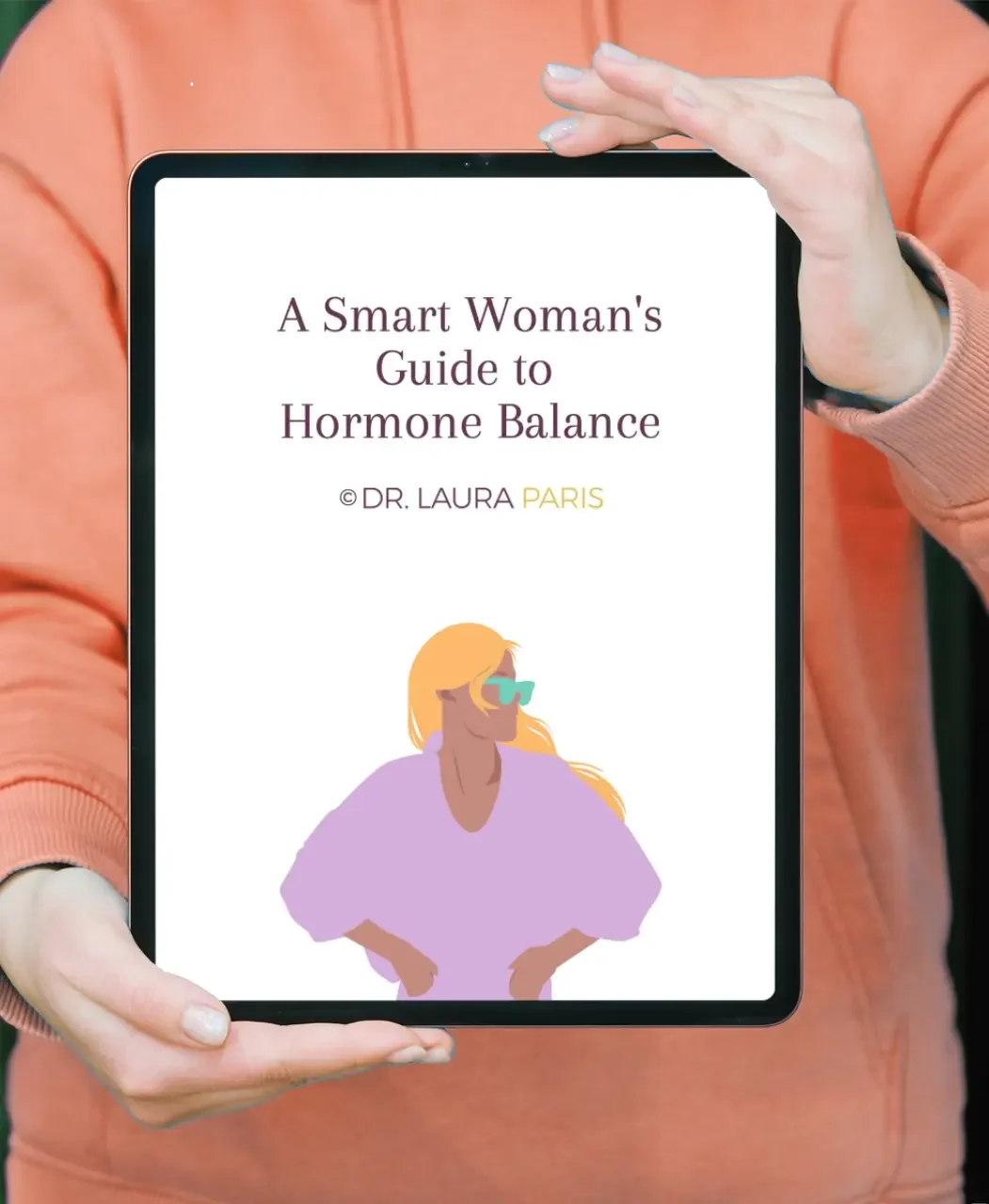
Are you ready to take charge of your health?I help women achieve vibrant health through all phases of life with a personalized, holistic approach.
Sign up for my newsletter and get your Free Gift:
A Smart Woman's Guide to Hormone Balance

Sign up for my newsletter and get your Free Gift:
A Smart Woman's Guide to Hormone Balance

Are you entering your 40s and still having regular periods? If so, you’re likely in the unique life stage of perimenopause, a natural time when hormone levels and cycles begin to shift gradually.
There’s no need to worry about reaching your 40s! Thankfully, this decade offers a generous transition from your reproductive years to menopause. You have time to prioritize your holistic well-being, laying the groundwork for a vibrant menopausal stage. In my work with women in perimenopause, we discuss strategies to support a smooth transition. Here are five key areas to focus on to prepare for a healthy perimenopause.
Self-care is essential for showing up as the best version of yourself. Place yourself at the top of your list—yes, before others. If you find this challenging, I recommend Victoria Albina’s Feminist Wellness podcast for insightful guidance. Make nourishing foods, quality sleep, and daily movement non-negotiable staples in your life.
Then, identify the practices that are essential to your mental well-being and ensure they’re also non-negotiable. Whether it’s regular massage, acupuncture, social connections, alone time, meditation, yoga, or creative hobbies, prioritize what rejuvenates you so you can fully enjoy and thrive in this life stage. – you GET to fit in the core things that relax and rejuvenate you.
During your 40s, progesterone levels gradually decline, often leading to shorter cycles that may start with spotting. Estrogen tends to decrease more rapidly and later, between ages 46 and 54. As a result, you may begin experiencing symptoms in your 40s, such as hot flashes, irregular cycles, insomnia, anxiety, and more. These are all signs of the hormonal shifts that signal perimenopause. Don’t hesitate to seek support for these symptoms!
For many, natural hormone replacement therapy (HRT) with a certified menopause specialist can offer relief. Educate yourself on the potential benefits of HRT—Inside Information with Dr. Lauren Streicher is an excellent podcast to start with. Research now shows that HRT not only alleviates symptoms but also supports bone density, heart health, and brain function while easing symptoms like vaginal dryness and painful intercourse. Use this time in your 40s to learn about HRT so that you feel empowered to make an informed choice as you approach menopause.
There are also other valuable treatments for perimenopause and menopause symptoms, including cognitive behavioral therapy, non-hormonal medications, and natural approaches like acupuncture, herbal remedies, and supplements. Be proactive in finding support and educating yourself on the best approaches for your unique journey.
Adrenal resilience is essential to navigate perimenopause smoothly because your adrenal glands take on hormone production as ovarian function decreases. Dysregulated adrenal hormone rhythms may lead to vasomotor symptoms like hot flashes, night sweats, and sleep disturbances.
Consider testing adrenal function and, if necessary, support it with lifestyle changes—improving stress management, sleep quality, and nutrition. Certain herbs and supplements may be helpful, but sustainable results come from holistic lifestyle changes.
In perimenopause, many women notice increased abdominal weight, often due to hormonal shifts linked to insulin levels. This change can signify insulin resistance, which develops gradually from high sugar and refined carb intake over the years.
A fasting blood panel can assess insulin resistance with tests for insulin, glucose, hemoglobin A1C, and triglycerides. If you find yourself in the insulin-resistant range (often reflected by an apple-shaped body or a waist circumference above 31″), you can learn to eat and exercise to reverse insulin resistance. A stable metabolism with balanced blood sugar can also ease perimenopausal symptoms, making this a win-win approach. Check out my article Understanding Metabolic Health: A Guide for Women.
For some women, using a GLP1 agonist weight loss drug can jumpstart metabolic healing. Read Weight Loss Drugs, Women, and Natural Alternatives to learn more.
Maintaining muscle mass as you age requires consistent effort, especially during perimenopause, when muscle loss accelerates. This isn’t just about staying fit—it’s essential for bone density, metabolic health, and physical independence as you age. Prioritize protein by including high-quality sources like lean meats, fish, eggs, and plant-based proteins throughout the day. Combine this with regular strength training exercises, like weight lifting or bodyweight workouts, to support muscle and bone density. Building strength now not only helps prevent weight gain but also sets you up for a more resilient, confident journey through perimenopause and beyond. Dr. Gabrielle Lyon, author of Forever Strong and host of the podcast the Dr. Gabrielle Lyon Show, has great information about muscle mass and getting adequate protein.
While there’s plenty more you can do to prepare for a healthy perimenopause, focusing on these five areas will provide a strong foundation. If you’d like personalized support, we’re here to help you navigate this important transition. Just as we assist women in enhancing fertility and preparing for a healthy pregnancy, we’re equally dedicated to helping women in perimenopause achieve a smooth and empowered transition into menopause. After all, many of us now spend a full third of our lives in menopause—it’s worth investing in your health to feel your best! Reach out to explore a customized perimenopause program tailored to your unique needs.
Any questions about this topic? I’d love to hear from you in the comments below.

Dr. Laura Paris is a women’s health specialist who provides Acupuncture and Functional Medicine care at her two clinics in Capitola and Monterey, California. She also works with women remotely in the United States through telehealth appointments. Learn more about Laura here, and message her directly here.
Click the button to talk to Dr Laura on a 20-minute discovery phone call ($67)